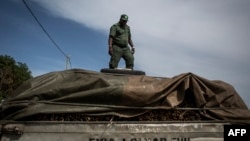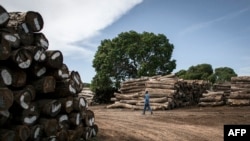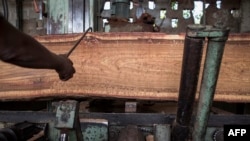Africa has long been known for its so-called “blood diamonds,” a term for mineral wealth that fuels violent conflict. In the Southern Africa country of Mozambique, a report finds “blood timber” largely fueled by market demand from China is financing an insurgency in northern Mozambique. But security analysts disagree on how much the militants are profiting from the wood sales.
An Islamic State-linked militant group has been waging an insurgency in Mozambique’s Cabo Delgado province since 2017, with some militants fighting in the name of jihad but most driven by economic exclusion in an area rich in rubies and natural gas.
A report this week by a U.K. and U.S.-based charity, the Environmental Investigation Agency (EIA), says one of the region’s other natural riches, luxury hardwood prized in China, is further fueling the fighting.
“The bleeding has to stop. Mozambique has had a log export ban since 2017, but we can see clearly that China — the importer of more than 90% of Mozambique’s wood — has continued massive volume of imports of logs,” the EIA’s Alex Bloom told VOA.
Only some of that amount is wood coming from insurgency-wracked areas, the EIA says, estimating that about 30 percent of timber from Cabo Delgado is coming from insurgent-controlled forests.
The agency says the timber is then brought to Chinese-owned sawmills in the town of Montepuez, where legal and conflict timber are processed together to disguise illegality before shipping.
Throughout the process, Chinese businesses allegedly pay bribes to government officials to smooth the way for the wood to travel to port for export. Some of the wood going from Cabo Delgado to China is a rosewood known as “hongmu,” which is used to make luxury furniture.
As a species listed in the Convention on International Trade in Endangered Species of Wild Fauna and Flora (CITES), rosewood is supposed to go through inspection by Mozambican officials to ensure that trade does not threaten its survival. However, due to corruption, this rarely happens, the EIA said.
Corruption allegations
“What we do is talk to the Chinese nicely so that we get our share of the bribe and they take the containers through the port,” one unnamed former official quoted in the report told the investigators.
EIA’s Bloom told VOA that because of the bribes, some Mozambican officials might not feel much incentive to stop the illegal timber trade.
“Many sources interviewed for this report described corruption at many levels through the timber trade, and some described a kind of symbiotic relationship between Mozambique officials, including the (governing) Frelimo party, and ‘China,’ referencing both the state and the Chinese business people in the trade sector in Cabo Delgado,” she said in an email.
Mozambique has been a beneficiary of Chinese leader Xi Jinping’s global infrastructure-building project the Belt and Road Initiative for years.
“Sources said, for example, that the Frelimo party gains legitimacy from attracting both Chinese business and large infrastructure investments, and even campaign funds; and therefore is reluctant to criticize or crack down on wide-scale corrupt practices involving these players,” noted Bloom.
The Chinese embassy in Washington and the Chinese mission to the African Union did not reply to emailed requests for comment from VOA.
VOA also attempted to contact Mozambique’s minister of land and environment, Ivete Maibaze, but received no answer. Contacted for comment, police spokesperson Leonel Muchina referred reporters to the Mozambican attorney general’s office. The attorney general’s office then referred VOA to a report it presented to parliament in April.
In that report, authorities acknowledge that “Illicit trade in species of wild flora and fauna or parts thereof has reached alarming proportions.”
It found there was illegal exploitation of forest resources in Cabo Delgado.
“These crimes, in addition to causing damage to the common good, the environment, are closely related to the occurrence of other criminal phenomena, such as terrorist financing, money laundering and corruption,” it said.
Resurgence of violence
Cabo Delgado was back in the news this month, after the insurgents staged a major assault on the key town of Macomia on May 10.
This, as French oil company TotalEnergies had been looking at resuming a $20 billion liquefied natural gas project in the province that it postponed due to the unrest.
The renewed violence comes as regional forces — which have been stationed in the area since 2021 — begin to pull out.
Jasmine Opperman, a security consultant based in South Africa, told VOA in a phone interview the withdrawal of South African troops is going to leave a vacuum.
“The attack in Macomia should be a harsh wake-up call to the region, in terms of where we stand with the insurgency. Numbers is not a problem, weapons is not a problem, money is not a problem,” she said.
While she noted the militants were not lacking in funds, she was skeptical they were getting money from the timber trade as the EIA suggests.
“That report is but speculation. The Chinese are in control of the whole illegal trade in wood, and it’s a complex, complex network. … There is no evidence that insurgents are deriving any income from illegal wood trade,” Opperman said.
“At level best where they could make money with this trade is if they’re being paid protection money by the Chinese. That is to say, to move into an area where there are insurgents, pay them to allow them access, cut the trees, [and] get the trees out with no one being attacked,” she added.
Piers Pigou, at the Institute for Security Studies in Pretoria, echoed the idea the militants could be making money that way.
"Where they could be involved is extracting rents in some way or another. … I think there are some question marks about exactly what the nature of that connectivity to the insurgency would be.”
Darren Olivier, director at African Defense Review, a conflict research consultancy, did not dismiss the idea either.
“The insurgency is clearly getting funding from somewhere, as there’s no way they’d be able to sustain this level of activity without a fairly substantial source of income,” he said.
VOA’s Portuguese Service contributed to this report.






